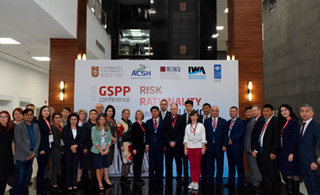Hub held a panel session on Public Service Reforms at the GSPP International Conference

On October 11, the Astana Civil Service Hub (ACSH) organized a panel session “Public Service Reforms in the Region: Practices and Lessons Learnt” in the framework of the Nazarbayev University Graduate School of Public Policy (GSPP) International Conference "Risk, Rationality and Resilience" in Nur-Sultan, Kazakhstan.
The ACSH panel served a multilateral discussion platform providing an opportunity to share experiences on public administration and civil service reforms, which have taken place in the countries of the region over the last three decades, and discussthe remaining challenges and perspectives for further development in the field.
It is noteworthy that presentations made at the session drew upon reviews and analysis conducted for the book of the same title as the panel, which is to be published by the ACSH in upcoming months.
Chairman of the ACSH Steering Committee Mr. Alikhan Baimenov, giving a welcoming speech, noted that “the great demand for understanding former socialist countries’ successes and challenges, along with lessons learnt, predetermined the need for a publication generalizing their experience of transformation, which is of great theoretical and practical importance for the way forward .”
Additionally, he stressed out that “while no “silver bullet” exists to enhance a governance system, learning best practices in the region and examining experiences of neighbor countries can help governments to find “best fit” solutions for their own settings.”
Professor of Public Administration, Institute of International Relations and Political Science of the Vilnius University Mr. Vitalis Narkosis presented Lithuanian experience on country’s transformation due to civil service reforms over 30 years, which imposed to the incredible changes in the public administration system and increased public trust in the government from 13% to 28%. On the other hand, Associate Professor and Head of Political Science Department of the University of Latvia Ms. Iveta Reinholde introduced Latvian innovation trends, in particular, revealing a policy of minimalistic public administration with slogan of “small is beautiful”, and also shared the experience of extra bonusing of civil servants.
In line of creation by the Government of Uzbekistan the Agency of Civil Service Development last weeks, which is a remarkable milestone on the way to effective civil service, the Smart Gov Consulting CEO Ms. Aziza Umarova shared with pros and cons of recent civil service reforms in Uzbekistan. She also noted that until recently “manual control” ("ручное управление") was practiced in the country, and today they are moving away from this type of governance with restructuring its state agencies.
Participants from Azerbaijan, Armenia, Belarus, Georgia, Kazakhstan, Kyrgyzstan, Latvia, Lithuania, Ukraine, and Uzbekistan significantly contributed to the discussion. During the panel, Lecturer at the Public Administration Academy and former Chairman of the Civil Service Council of the Republic of Armenia Mr. Manvel Badalyan, Associate Professor of the Department of Economics and Business Administration at the Azerbaijan State University of Economics Ms. Afag Hussein, Deputy Director of the Institute of Civil Service at the Academy of Public Administration under the aegis of the President of the Republic of Belarus Mr. Anatoly Biassmertny, Acting Deputy Head of the Civil Service Bureau of Georgia Ms. Irina Aghapishvili, Assistant Professor at the Graduate School of Public Policy at Nazarbayev University Ms. Saltanat Janenova, Member of the ACSH Steering Committee Mr. Almaz Nasyrov, and Head of the Department of Informatization and Software Projects of the Center for Adaptation of the Civil Service to the standards of the EU, Ukraine, Mr. Yuriy Shchepotko have shared their country's experience of reforming the civil service. The speakers found the panel mutually beneficial, and highly valued that it integrated the views of both academics and practitioners.
The panel session also was attended by representatives of the Executive Office of the President and Government of the Republic of Kazakhstan, as well as Kazakhstani leading academics. The civil servants and researchers participated to various sessions of the GSPP Conference, where they exchanged their visions on policy and practice issues in public administration.



